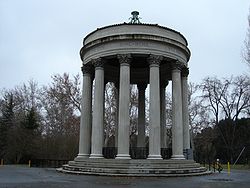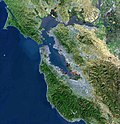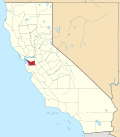Sunol, California
Sunol, California Suñol | |
|---|---|
 Historic Sunol Train Depot, on the Niles Canyon Railway | |
 Location in Alameda County and the state of California | |
| Coordinates: 37°35′40″N 121°53′19″W / 37.59444°N 121.88861°W | |
| Country | |
| State | |
| County | Alameda |
| Government | |
| • State Senate | Jesse Arreguín (D)[1] |
| • State Assembly | Liz Ortega (D)[2] |
| • U. S. Congress | Eric Swalwell (D)[3] |
| Area | |
• Total | 28.59 sq mi (74.0 km2) |
| • Land | 28.26 sq mi (73.2 km2) |
| • Water | 0.334 sq mi (0.87 km2) 1.2% |
| Elevation | 266 ft (81 m) |
| Population (2020)[6] | |
• Total | 922 |
| • Density | 32/sq mi (12/km2) |
| Time zone | UTC-8 (Pacific (PST)) |
| • Summer (DST) | UTC-7 (PDT) |
| ZIP code | 94586 |
| Area code(s) | 925, 510, 341 |
| FIPS code | 06-77042 |
| GNIS feature IDs | 1670341, 2410033 |
Sunol (Spanish: Suñol) is an unincorporated area and census-designated place in Alameda County, California. Located in the Sunol Valley of the East Bay, the population was 922 at the 2020 census. It is best known as the location of the Sunol Water Temple and for its historic tourist railroad system, the Niles Canyon Railway.
Etymology
[edit]
Sunol, formerly Sunolglen, is named for Don Antonio Suñol. His adobe ranch house from the 1840s was located where the San Francisco water system's works are now located.[7]
History
[edit]The first Sunol post office opened in 1871 and the name was changed to Sunolglen the same year.[8] The name reverted to Sunol in 1920.[8] The town's name is in honor of Antonio Suñol, first postmaster in nearby San Jose and part owner of the historical Rancho Valle de San Jose land grant that once contained the site of the town.[8] Thomas Foxwell Bachelder had large farm in Sunol and sold land in 1884 that founded much of the town.[9][10][11]
Geography
[edit]Sunol is located adjacent to two railroads and lies near the crossroads of Interstate 680 and State Route 84. These connect Sunol with Fremont to the south and west, Pleasanton to the north, and Livermore to the northeast. Sunol sits 17 miles (27 km) north of the center of San Jose and 32 miles (51 km) southeast of San Francisco.
The town lies near Alameda Creek at the northwest edge of the Sunol Valley. The San Antonio Reservoir lies 3 miles (4.8 km) to Sunol's east, and the Calaveras Reservoir lies 8 miles (13 km) south of the town.
North of downtown is the neighborhood of Kilkare Woods.[12]
According to the United States Census Bureau, the Sunol CDP has a total area of 28.6 square miles (74 km2), of which 98.8% is land and 1.2% is water.[4]
Demographics
[edit]The 2020 United States Census reported that Sunol had a population of 922. The population density was 32.6 inhabitants per square mile (12.6/km2). The racial makeup of Sunol was 71.0% White, 0.4% African American, 0.1% Native American, 11.4% Asian, 0.5% Pacific Islander, 4.1% from other races, and 12.4% from two or more races. Hispanic or Latino of any race were 15.5% of the population.
The Census reported that 99.3% of the population lived in households, 0.7% lived in non-institutionalized group quarters, and none were institutionalized.
There were 359 households, out of which 22.3% included children under the age of 18, 59.6% were married-couple households, 4.7% were cohabiting couple households, 14.8% had a female householder with no partner present, and 20.9% had a male householder with no partner present. 24.0% of households were one person, and 14.8% were one person aged 65 or older. The average household size was 2.55. There were 259 families (72.1% of all households).
The age distribution was 14.3% under the age of 18, 7.6% aged 18 to 24, 21.3% aged 25 to 44, 30.0% aged 45 to 64, and 26.8% who were 65 years of age or older. The median age was 51.7 years. For every 100 females, there were 101.3 males.
There were 398 housing units at an average density of 14.1 units per square mile (5.4 units/km2), of which 359 (90.2%) were occupied. Of these, 76.9% were owner-occupied, and 23.1% were occupied by renters.[13][14]
In 2023, the US Census Bureau estimated that the median household income was $182,250, and the per capita income was $94,218. Of those aged 16 and over, 58.4% were employed.[15]
Area attractions
[edit]
- The Sunol Water Temple is an unusual Roman-inspired structure that marks the confluence of three sources of water that flow into the Sunol Valley.[16]
- Sunol Regional Wilderness is part of the East Bay Regional Parks District, and has hiking trails, naturalist events, and a visitor center.[17]
- The Niles Canyon Railway Sunol Depot was built in 1884, and is the last surviving example of a Southern Pacific standard design known as a "One-Story Combination Depot #7." The building has been restored and is operated by the Pacific Locomotive Association.
- Niles Canyon Road runs westward from Sunol and is a scenic 7-mile (11 km) drive to Fremont.
- A statue of Bosco, the dog elected mayor,[18] sits in front of the Post Office.[19] Bosco achieved a degree of international notoriety in 1990 when the Chinese newspaper People's Daily reported on his tenure as an alleged example of the failings of the American electoral process.[20]
- In 2007, songwriter Will Stratton released a song named after the town on his first album.[21]
School district
[edit]The majority of Sunol is in the Sunol Glen Unified School District. Castro Valley Unified School District and Pleasanton Unified School District have small portions of Sunol.[22]
The Sunol Glen School, a K–8 public school, is the sole school of Sunol Glen USD.[23] High school students are served by other local high schools, including Foothill High School in nearby Pleasanton.[citation needed]
References
[edit]- ^ "Senators". State of California. Retrieved March 18, 2013.
- ^ "Members Assembly". State of California. Retrieved March 18, 2013.
- ^ "California's 14th Congressional District - Representatives & District Map". Civic Impulse, LLC. Retrieved March 9, 2013.
- ^ a b "2020 U.S. Gazetteer Files". United States Census Bureau. Retrieved August 30, 2023.
- ^ "Sunol". Geographic Names Information System. United States Geological Survey, United States Department of the Interior.
- ^ "Sunol CDP, California". United States Census Bureau. Retrieved August 30, 2023.
- ^ Capace, Nancy (1999). Encyclopedia of California. North American Book Dist LLC. Page 447. ISBN 9780403093182.
- ^ a b c Durham, David L. (1998). California's Geographic Names: A Gazetteer of Historic and Modern Names of the State. Clovis, California: Word Dancer Press. p. 710. ISBN 1-884995-14-4.
- ^ National Register of Historic Places Continuation Sheet Thomas Foxwell Bachelder Barn, npgallery.nps.gov
- ^ "Help! Here Comes the Sun!". Marie Antoinette Interiors.
- ^ "Recognized on Historic Register". February 23, 2006.
- ^ "Maps | Alameda County". www.acgov.org. Retrieved March 7, 2025.
- ^ "Sunol CDP, California; DP1: Profile of General Population and Housing Characteristics - 2020 Census of Population and Housing". US Census Bureau. Retrieved March 20, 2025.
- ^ "Sunol CDP, California; P16: Household Type - 2020 Census of Population and Housing". US Census Bureau. Retrieved March 20, 2025.
- ^ "Sunol CDP, California; DP03: Selected Economic Characteristics - 2023 ACS 5-Year Estimates Comparison Profiles". US Census Bureau. Retrieved March 20, 2025.
- ^ "San Francisco Water Power Sewer | SFPUC". December 14, 2023.
- ^ "Sunol Wilderness Regional Preserve | East Bay Parks". www.ebparks.org. March 8, 2025. Retrieved March 6, 2025.
- ^ Teresa Brown (November 29, 2002). "Welcome to Sunol" (PDF). Pleasanton Weekly. Retrieved June 20, 2008.
- ^ "Bay Area's First Canine Mayor Memorialized". NBC Bay Area. San Jose, California: NBCUniversal. December 17, 2008. Retrieved October 27, 2013.
- ^ George Lewis (February 26, 1990). "Sunol, California / Dogmocracy / Bosco The Dog". NBC Evening News. Retrieved June 20, 2008.
- ^ Erik Hage (May 1, 2007). "What the Night Said". Allmusic.com. Retrieved July 20, 2009.
- ^ "2020 Census – School District Reference Map: Alameda County, CA" (PDF). U.S. Census Bureau. Retrieved December 15, 2022.
- ^ "Our History". Sunol Glen Unified School District. Retrieved December 15, 2022.
- "Sunol". Geographic Names Information System. United States Geological Survey, United States Department of the Interior.


 French
French Deutsch
Deutsch
